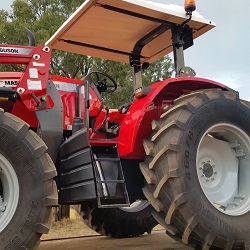An important decision for any farm, no matter the size, is tractor selection. The tractor needs to right for your application and your budget, so there are many things to consider.
The best place to start is listing everything that you may need a tractor to do. We use our tractor for slashing, ploughing, seeding, post-hole digger for fencing, lifting and moving hay bales and other heavy items, a spray rig for weeds and fertiliser, and a front-bucket for digging and moving dirt. That's a long list! When you know what the tractor will need to do, so you can start to figure out what size tractor you will need. A tractor dealer can also help at this point.

From the list above, ploughing is the most intensive job from a horse power point of view. And lifting is the most intensive job for the front hydraulics. So the next question is how big is the plough you want to pull and how much do you want to lift? We already had a plough, so we had to size the tractor to match, but if you're planning on buying implements, you can get the right size to suit your chosen tractor instead. We also knew that lifting at least one tonne would be useful - that's one full cube of water, or one bag of fertiliser or seed.
Do not underestimate your tractor requirements! As your farm progresses, you may find that you need the tractor to do more. It will cost you more in the long-run to upgrade to a larger tractor as you always lose some money in the resale, so its better to go slightly larger if you can afford it. Also make sure that you carefully compare tractor ratings - often the horsepower in the glossy advertisement is not an accurate reflection of the power you will see at the PTO, you really need to read the details and compare PTO power and torque, and hydraulic pressure, so make sure it will do what you need it to do.
Should you buy new or second-hand? This is a really hard one and depends on the second-hand market in your area (how far do you want to move this tractor, even if its a good deal?) and how much time and capability you have to maintain an older model. Buying second-hand through a dealer is a good compromise, as you will get some warranty and at least know more about the condition of the tractor. I also find that in a small town, reputation is pretty important to small business, so they will try to look after you if they can.
If you are claiming primary producer tax offsets, you can often depreciate a new tractor, so it can be advantageous from a tax perspective. The newer tractors also have all the latest safety features such as roll-over-protection (ROPs) and seat belts.
Finally, do you actually need a tractor? If you have a smaller farm, you may be able to use a quad-bike with various implements rather than making the full investment in a tractor. Take your time to consider all your options and talk to plenty of neighbours to find out which tractors they recommend.
About the author
Liz Beavis lives on 258 acres at Kumbia, QLD, with her husband, dogs and a small herd of Angus cattle. They are working to develop the property using permaculture and holistic management practices. You can read more on her blog at https://eight-acres.com.au/blogs/news.
.jpg)


